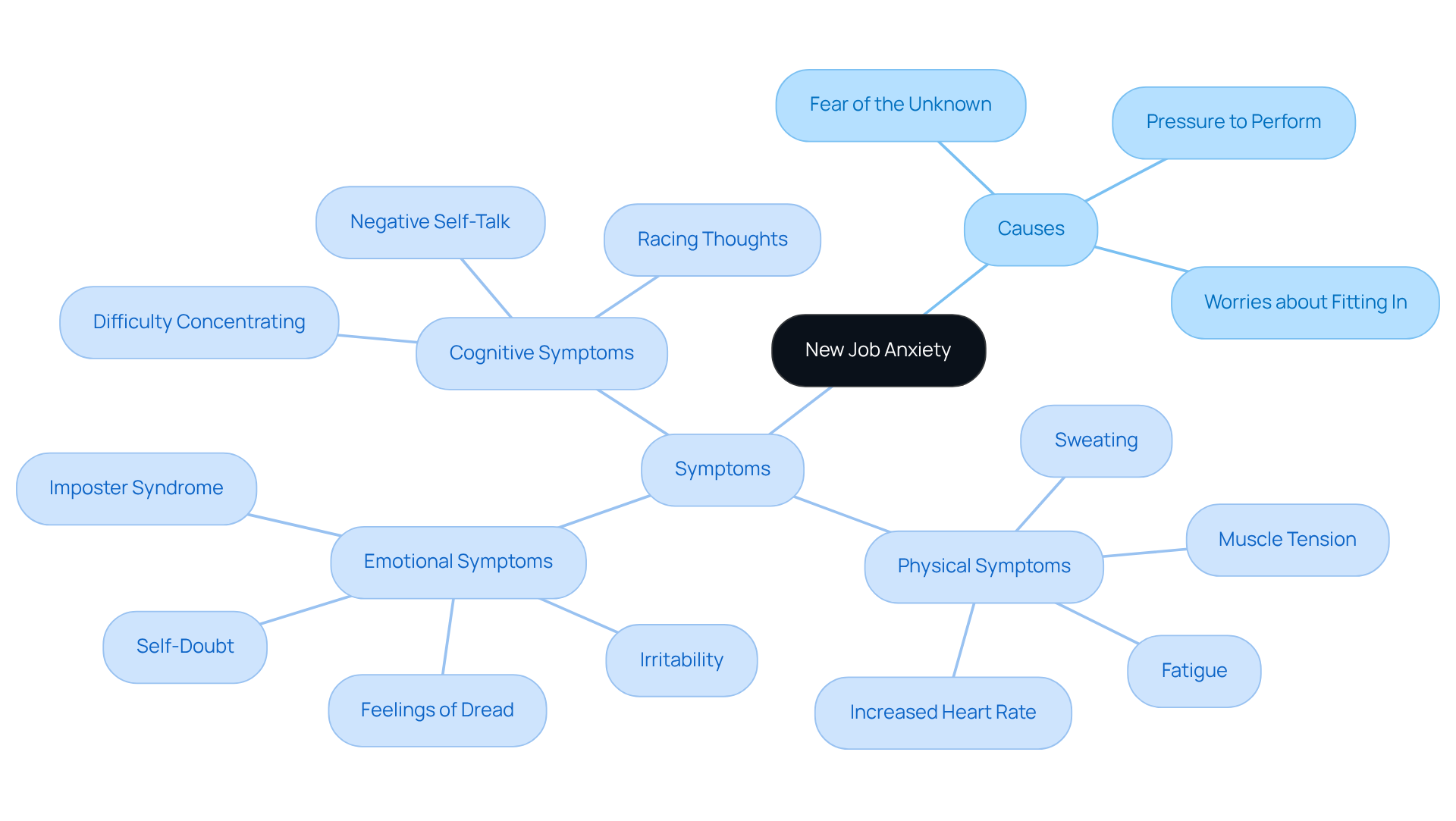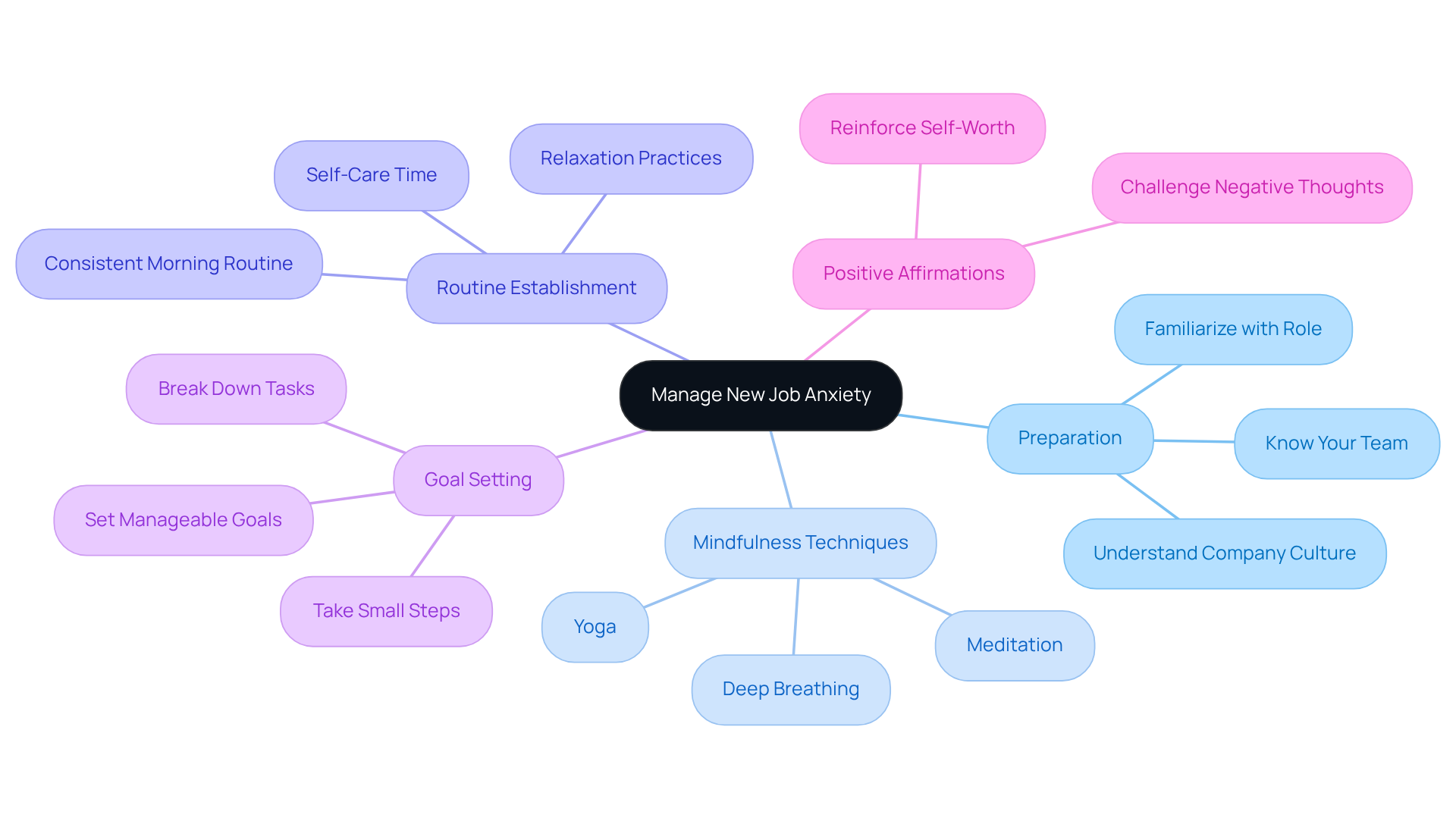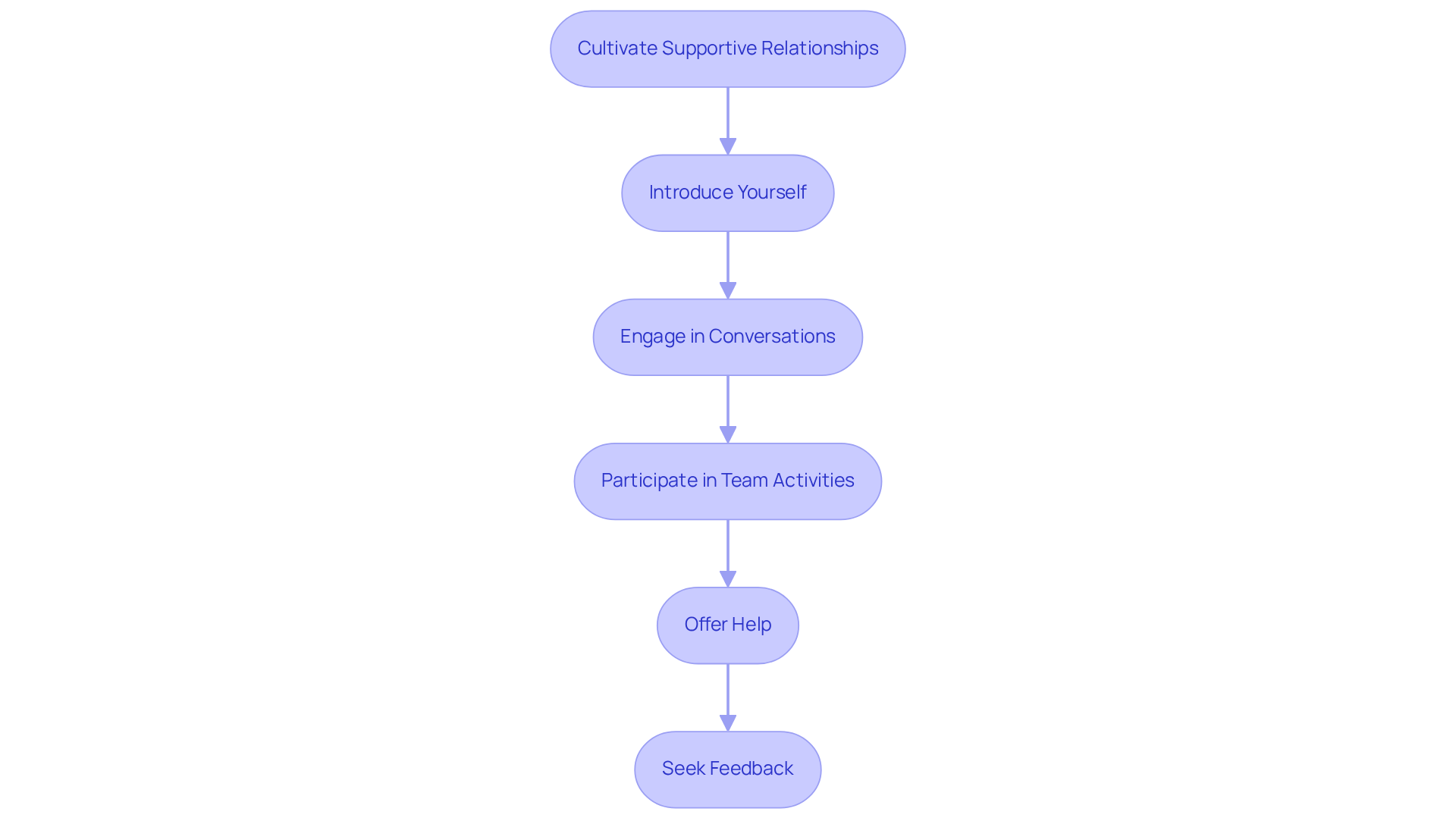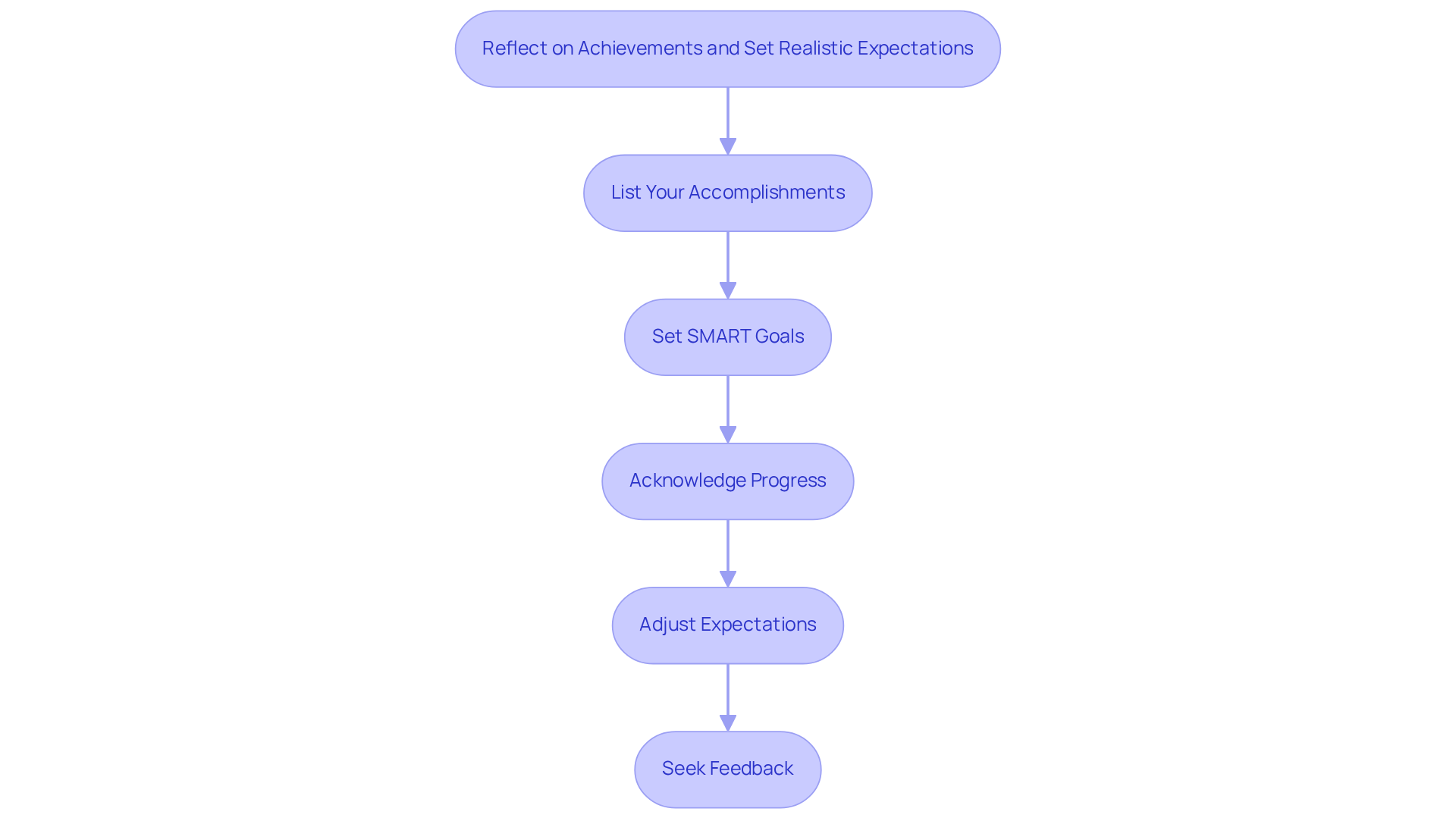Overview
Starting a new job can often bring about feelings of anxiety, but it is possible to navigate these emotions effectively through four key steps:
- Preparation
- Mindfulness techniques
- Establishing supportive relationships
- Reflecting on achievements while setting realistic expectations
Have you ever felt overwhelmed by the thought of a new role? By familiarizing yourself with your new responsibilities, practicing self-care, engaging with your colleagues, and celebrating even the smallest victories, you can significantly lessen your anxiety.
This nurturing approach not only fosters a positive transition into your new job but also encourages personal growth and resilience. Remember, you are not alone in this journey; many have walked a similar path and emerged stronger. Embrace this opportunity for change, and allow yourself to feel supported as you step into your new role.
Introduction
New job anxiety is a common hurdle that many individuals face as they step into unfamiliar work environments. This emotional response, often fueled by fears of the unknown and the pressure to perform, can manifest in various physical and psychological symptoms, leaving new employees feeling overwhelmed.
Have you ever felt this way? It’s important to recognize that you are not alone in this experience. However, by understanding the roots of this anxiety and implementing practical strategies, individuals can transform their experience into an opportunity for growth.
As we explore this further, how can one navigate the complexities of starting a new job while effectively managing the anxiety that often accompanies such transitions? Together, we can find ways to turn this challenge into a stepping stone for personal development.
Understand New Job Anxiety: Causes and Symptoms
New job anxiety can stem from various sources, such as the fear of the unknown, pressure to perform, and worries about fitting in with new colleagues. It's important to recognize that an estimated 31.1% of U.S. adults experience disorders related to worry at some point in their lives, which underscores the commonality of new job anxiety and stress symptoms among new employees. Common symptoms include:
- Physical Symptoms: Increased heart rate, sweating, fatigue, and muscle tension.
- Emotional Symptoms: Feelings of dread, irritability, and self-doubt, often intensified by imposter syndrome, which affects 82% of Americans at some stage.
- Cognitive Symptoms: Difficulty concentrating, racing thoughts, and negative self-talk, which can leave individuals feeling overwhelmed.
Recognizing these symptoms is crucial for effective management. Understanding that such feelings are normal can empower you to take to address your new job anxiety. Have you ever felt overwhelmed by your past? Engaging in mindfulness techniques can help anchor you in the present moment, alleviating the tide of fear and nervousness. Additionally, seeking support from colleagues or a therapist can provide valuable perspectives and coping strategies.
At The Emerald Couch, we offer a free 30-minute consultation to help you better understand your needs and tailor our services to your unique situation. We recognize that therapy is a journey, and it may take time—typically around 4 to 6 weeks—for clients to start feeling better. Our specialists are here to support you in finding the right therapeutic approach, ensuring that you feel comfortable and understood throughout the process. By normalizing these experiences, you can better navigate your new role and manage new job anxiety while cultivating resilience in the face of stress.

Implement Practical Strategies to Manage Anxiety
Managing new job anxiety can feel overwhelming, but there are gentle strategies that can help ease this transition.
- Preparation: Start by familiarizing yourself with your new role, the company culture, and your team. When you know what to expect, it can significantly reduce feelings of anxiety.
- Mindfulness Techniques: Consider incorporating practices like deep breathing, meditation, or yoga into your routine. These techniques can help , creating a sense of peace.
- Routine Establishment: Establishing a consistent morning routine that includes time for self-care and relaxation can set a positive tone for your day.
- Goal Setting: Breaking down your tasks into manageable goals can help prevent feelings of being overwhelmed. Remember, taking small steps is perfectly okay.
- Positive Affirmations: Using affirmations to challenge negative thoughts can be powerful. Reinforcing your self-worth is an essential part of this journey.
By implementing these nurturing strategies, you can create a smoother transition into your new role, helping to manage new job anxiety and allowing you to embrace this exciting change with confidence.

Cultivate Supportive Relationships with Colleagues
Cultivating supportive relationships with your colleagues can greatly enhance your workplace experience.
- Introduce Yourself: Taking the first step to introduce yourself to team members can be a warm gesture. A simple greeting can break the ice, creating a welcoming atmosphere for future interactions.
- Engage in Conversations: Have you ever found joy in learning about others? Asking open-ended questions about their roles and experiences encourages meaningful dialogue. This not only enriches your understanding but also shows your genuine interest in their contributions.
- Participate in Team Activities: Joining team lunches, meetings, or social events can be a wonderful way to build rapport. Engaging in these activities fosters a sense of belonging, helping to alleviate feelings of isolation.
- Offer Help: Being willing to assist others can create a nurturing support system. When you help colleagues, you strengthen bonds and contribute to a , where everyone feels valued.
- Seek Feedback: Regularly asking for feedback on your work demonstrates that you value others' opinions and are open to growth. This practice not only enhances your relationships but also supports your personal and professional development.
By embracing these actions, you can feel more connected and supported in overcoming your new job anxiety. Ultimately, managing new job anxiety can decrease stress and promote a healthier work environment, making your journey together more fulfilling.

Reflect on Achievements and Set Realistic Expectations
To effectively reflect on your achievements and set realistic expectations, consider these nurturing steps:
- List Your Accomplishments: Take a moment to document your past successes, no matter how small they may seem. This practice serves as a gentle reminder of your capabilities and helps build your confidence.
- Set SMART Goals: When formulating your goals, aim for them to be Specific, Measurable, Achievable, Relevant, and Time-bound. This organized approach not only preserves clarity and focus but also minimizes new job anxiety about your performance.
- Acknowledge Progress: Celebrate those small wins throughout your journey. Recognizing these achievements can significantly uplift your confidence and motivation. Consider journaling about these moments; it can be a valuable outlet for reflection and stress management. Incorporating mindfulness techniques, such as breath awareness and body scans, can enhance this process, grounding you in the present moment and helping you appreciate your journey. Mindfulness, rooted in ancient Eastern philosophies, is about cultivating awareness that arises through paying attention, on purpose, in the present moment, non-judgmentally.
- Adjust Expectations: Embrace flexibility in your goals. Allowing space for growth and learning is essential, as it enables you to adapt to new challenges without feeling overwhelmed. Mindfulness practices can assist in this adjustment, helping you stay present and focused on your current experiences rather than getting lost in worries about the future.
- Seek Feedback: Regularly engage with your supervisor or mentor to ensure your expectations align with organizational goals. Constructive feedback can offer valuable insights, allowing you to adjust your approach as needed. Remember, it’s vital to feel valued for who you are, not just for your achievements, as this is crucial for your overall well-being.
By reflecting on your achievements and setting realistic expectations, you cultivate a positive mindset that can help manage new job anxiety as you transition into a new job. This practice ultimately and enhances your performance, fostering a nurturing environment for your growth.

Conclusion
New job anxiety is a common experience that many individuals face when starting a new role. Understanding its causes and symptoms is the first step toward effective management. Have you ever felt overwhelmed by the fear and self-doubt that can accompany such transitions? Recognizing that these feelings are normal can empower you to take proactive measures, such as seeking support and employing mindfulness techniques to navigate this challenging journey.
This article emphasizes practical strategies for managing anxiety, including:
- Preparation
- Mindfulness practices
- Establishing routines
- Setting realistic goals
- Cultivating supportive relationships with colleagues
Each of these approaches not only aids in reducing anxiety but also enhances your overall workplace experience. By reflecting on your achievements and adjusting expectations, you can foster a positive mindset that encourages personal growth and resilience.
Ultimately, overcoming new job anxiety is about embracing the journey with confidence and self-compassion. By implementing these strategies, you can create a supportive environment that allows you to thrive in your new role. Taking the initiative to connect with colleagues and practicing self-care can transform the anxiety of starting anew into an opportunity for growth and fulfillment. Remember, you are not alone in this journey, and reaching out for support can make all the difference.
Frequently Asked Questions
What causes new job anxiety?
New job anxiety can be caused by various factors, including the fear of the unknown, pressure to perform, and worries about fitting in with new colleagues.
How common is new job anxiety?
An estimated 31.1% of U.S. adults experience disorders related to worry at some point in their lives, highlighting the commonality of new job anxiety and stress symptoms among new employees.
What are the common symptoms of new job anxiety?
Common symptoms include physical symptoms such as increased heart rate, sweating, fatigue, and muscle tension; emotional symptoms like feelings of dread, irritability, and self-doubt; and cognitive symptoms including difficulty concentrating, racing thoughts, and negative self-talk.
How can mindfulness techniques help with new job anxiety?
Engaging in mindfulness techniques can help anchor individuals in the present moment, alleviating feelings of fear and nervousness associated with new job anxiety.
What support options are available for managing new job anxiety?
Seeking support from colleagues or a therapist can provide valuable perspectives and coping strategies to manage new job anxiety effectively.
What services does The Emerald Couch offer for individuals experiencing new job anxiety?
The Emerald Couch offers a free 30-minute consultation to help individuals understand their needs and tailor services to their unique situations, recognizing that therapy is a journey that may take time to yield results.
How long does it typically take for clients to start feeling better in therapy?
It typically takes around 4 to 6 weeks for clients to start feeling better in therapy.
Why is it important to recognize and normalize feelings of new job anxiety?
Recognizing and normalizing these feelings can empower individuals to take proactive steps to address their anxiety, helping them navigate their new role and cultivate resilience in the face of stress.




